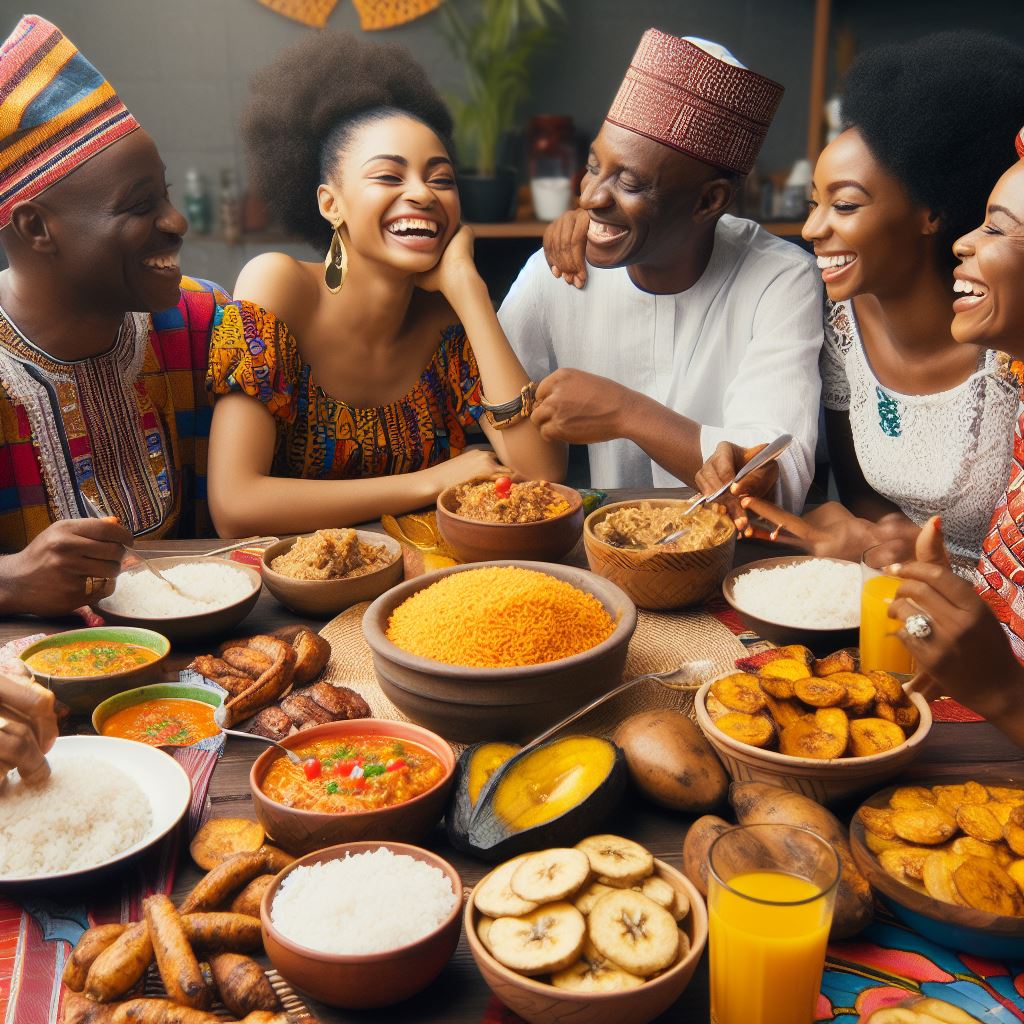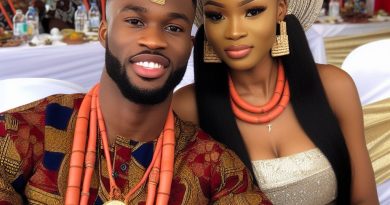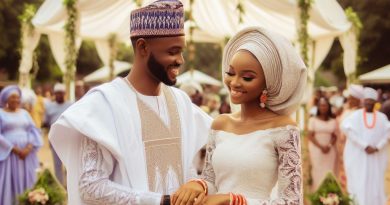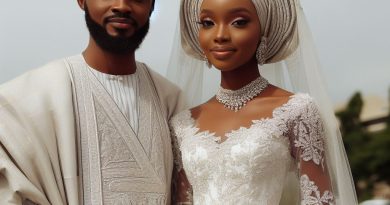Cultural Dynamics and Its Effect on Marriages in Nigeria
Last Updated on October 22, 2023
Introduction
A. Definition of cultural dynamics
Cultural dynamics refers to the continuous changes and interactions within a society’s cultural practices, beliefs, and values.
Understanding cultural dynamics is essential in comprehending Nigerian marriages.
B. Importance of cultural dynamics in understanding Nigerian marriages
The significance of cultural dynamics lies in its ability to shed light on the various aspects of Nigerian marriages.
C. Thesis statement
The impact of cultural dynamics on marriages in Nigeria is significant and diverse.
Nigerian marriages are deeply influenced by cultural dynamics, which play a crucial role in shaping relationship dynamics and expectations.
These dynamics encompass various elements such as gender roles, family structures, religion, and traditions.
Understanding cultural dynamics helps to navigate interpersonal relationships and establish a strong foundation for marriages.
Cultural norms dictate expectations, responsibilities, and roles within the marital union, which can lead to conflict or harmonious relationships.
Moreover, the impact of cultural dynamics is pronounced in areas such as dowry and bride price, arranged marriages, and polygamy.
These practices are deeply rooted in Nigerian culture and have a significant influence on marital stability and dynamics.
For instance, the exchange of dowry or bride price is not only a symbolic gesture but also a reflection of cultural values and expectations.
Additionally, arranged marriages, though less common in contemporary Nigeria, still have some prevalence and can greatly impact the success of a marriage.
Furthermore, the practice of polygamy, which is permissible under Nigerian customary law, introduces unique challenges within a union.
Basically, cultural dynamics have a profound impact on marriages in Nigeria, shaping expectations, roles, and relationship dynamics.
Understanding these dynamics is crucial for fostering healthy and successful marital relationships.
Read: Online vs. In-Person: Which Counselling Approach Suits You?
Overview of Nigerian Culture
A. Diversity of ethnic groups and languages
Nigerian culture is renowned for its rich diversity of ethnic groups and languages.
With over 250 different ethnic groups, Nigeria is a melting pot of cultural traditions and practices.
Each ethnic group has its own distinct language, costumes, and customs, contributing to the vibrant tapestry of Nigerian society.
B. Values and traditions that shape Nigerian society
Respect for elders is a core value in Nigerian culture. Elders are seen as the custodians of wisdom and are accorded great respect and honor.
This reverence for elders extends beyond the family unit and is present in all aspects of Nigerian society.
It is common for younger members of the community to seek guidance and advice from their elders in matters of importance.
Communal living is another essential aspect of Nigerian culture. The concept of “ubuntu,” or the belief in a shared humanity, is deeply ingrained in the Nigerian psyche.
Nigerians value the collective over the individual, and decisions are often made with the community’s best interests in mind.
This sense of communal identity fosters a strong sense of belonging and unity among Nigerians.
C. Role of religion in Nigerian culture
Religion holds great significance in Nigerian culture.
Nigeria is mainly split between Christianity and Islam, with a smaller population practicing traditional African religions.
Religious beliefs and practices permeate all aspects of Nigerian life, from daily rituals to major life events such as marriages.
Religious institutions play a vital role in shaping societal norms and values.
D. Importance of family and community in Nigerian marriages
In Nigerian marriages, the family and community play an integral role. Marriage is not simply a union between two individuals but a merging of two families.
It is common for prospective spouses to seek their families’ approval and blessings before formalizing the relationship.
Additionally, extended family members actively participate in the wedding preparations and celebrations.
The importance of family and community support in Nigerian marriages cannot be overstated.
The family provides a safety net for couples, offering guidance and assistance throughout their journey.
In times of difficulty, the couple can turn to their family and community for emotional and financial support.
Nigerian marriages are seen as a union not only between two individuals but between two families and communities.
In fact, Nigerian culture is a tapestry of diverse ethnic groups and languages, shaped by values such as respect for elders and communal living.
Religion plays a significant role in Nigerian society, and family and community support are essential in Nigerian marriages.
This rich cultural heritage and strong sense of community contribute to the dynamic nature of marriages in Nigeria.
Read Challenges and Joys: The Meaning of Marriage in Nigeria
Cultural Dynamics Affecting Marriages in Nigeria
A. Arranged marriages and parental influence
In Nigeria, cultural dynamics play a significant role in shaping marriages and influencing their outcomes.
Arranged marriages, a common practice in the country, are heavily influenced by parental decisions.
The historical background of arranged marriages in Nigeria is deeply rooted in tradition and cultural norms.
Parents have traditionally taken a leading role in selecting suitable partners for their children based on various criteria such as family background, social status, and tribal affiliation.
This practice demonstrates the honor and respect children are expected to show towards their parents’ decisions.
However, couples in arranged marriages often face numerous challenges.
These challenges may arise from differences in personality, lack of emotional connection, or the pressure to conform to societal expectations.
Communication and compatibility issues can also arise when couples have limited or no say in the selection process.
While arranged marriages can lead to successful unions, they require effort from both parties to overcome these challenges and build a strong foundation.
B. Bride wealth and dowry traditions
Another cultural dynamic affecting marriages in Nigeria is the tradition of bride wealth and dowry.
Bride wealth, also known as bride price, refers to the payment made by the groom or his family to the bride’s family.
This practice is significant in showcasing the groom’s ability to provide for the bride and establish financial stability within the marriage.
The negotiation process, exchange of gifts, and adherence to specific procedures symbolize respect and importance for traditional values.
However, the effects of bride wealth and dowry traditions on marriages can be complex.
On one hand, it can strengthen economic ties between families and promote unity.
On the other hand, it can create power imbalances within the marital relationship, where the bride’s family may have expectations and influence over certain decisions.
These dynamics can impact issues such as financial control, decision-making authority, and overall marital satisfaction.
C. Polygamy and multiple wives
Polygamy, the practice of having multiple wives, is another cultural dynamic that significantly affects marriages in Nigeria.
Historically, polygamy has been widely practiced in Nigeria, often rooted in cultural and religious beliefs. It allows men to marry multiple women and expand their families.
However, this practice can have emotional consequences and challenges for spouses. Jealousy, competition, and lack of attention from the husband are some common issues faced by wives in polygamous marriages.
Maintaining harmony and meeting the needs of multiple partners can be demanding and emotionally draining.
D. Gender roles and expectations
Traditional gender roles also shape marital dynamics in Nigerian society.
Men are traditionally expected to be the breadwinners and decision-makers, while women are assigned roles as homemakers and caretakers.
These gender roles can impact power dynamics within the marriage, with men often having the final say in important matters.
However, as Nigerian society becomes more modernized and influenced by external factors, such as education and exposure to different cultures, gender dynamics are gradually changing.
Women now have more opportunities for education and career advancement, challenging traditional roles and expectations.
In essence , cultural dynamics in Nigeria have a profound impact on marriages.
Arranged marriages, bride wealth and dowry traditions, polygamy, and gender roles all shape the experiences and expectations within marriages.
While some cultural practices can strengthen familial ties and promote stability, they can also present challenges and power imbalances.
As Nigerian society evolves, it is important to navigate these dynamics with open communication, respect, and a willingness to embrace change, ensuring a healthier and more fulfilling marital experience for all.
Read: Modern Nigerian Couples: New Takes on Age-Old Traditions

Impact of Cultural Dynamics on Marital Stability and Satisfaction
A. Communication and understanding challenges
- Language barriers hinder effective communication and lead to cultural misunderstandings.
- Marital conflicts in intercultural marriages require negotiating and bridging cultural differences.
- Cultural sensitivity and compromise are crucial for fostering understanding and resolving conflicts.
B. Emotional well-being and mental health
- The dynamics of cultural fusion impact marital satisfaction, leading to psychological effects.
- Couples face societal pressures and expectations, adding to emotional stress in intercultural marriages.
- Seeking professional help and establishing support systems can strengthen emotional well-being.
C. Strategies for successful intercultural marriages
- Promote open dialogues and cultivate mutual respect to enhance communication and understanding.
- Embrace cultural diversity by learning about each other’s traditions, customs, and values.
- Encourage compromise and adaptability to foster harmony and create a balanced multicultural environment.
Read: Defining Love, Commitment, and Unity in Nigerian Marriages
Conclusion
A. Recap of the impact of cultural dynamics on marriages in Nigeria
Cultural dynamics play a significant role in shaping marriages in Nigeria.
From the issue of dowry payment to religious practices and family expectations.
These factors heavily influence the success and satisfaction of marital relationships.
B. Encouragement for cultural appreciation and understanding
It is crucial for couples to recognize and appreciate each other’s cultural backgrounds.
This can be achieved through open communication, respect, and a willingness to learn and understand each other’s traditions, beliefs, and values.
C. Reminder that cultural dynamics should not hinder love and happiness in marriages
While cultural differences can present challenges, it is essential to remember that love and happiness should guide any marriage.
It is possible to navigate through cultural barriers and find common ground that allows both partners to feel valued and supported.
Generally, cultural dynamics enrich marriages in Nigeria, bringing diversity, tradition, and depth to the union.
By appreciating and understanding each other’s cultures, couples can build strong and harmonious relationships that withstand the test of time.
Let love and happiness be the driving forces, transcending any cultural barriers that may arise.


